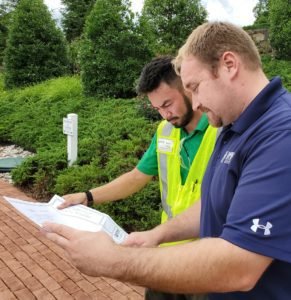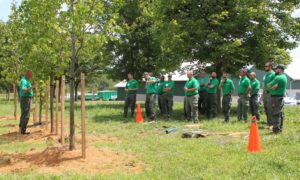By Phil Key
 One of the things I like most about my job is that I have the benefit of interacting with many people— both outside and inside the company. I’ve been fortunate to meet many of you who work within our company at trainings, banquets and branch visits. And through customer interactions, board involvement and associations we belong to, I get to speak with many people who are outside of the company. These conversations reinforce that what really makes us special isn’t any one system or process, it’s our culture. Our unique company culture is one of the things that not only sets us apart from our competition but provides a compass by which we guide our decisions and lead our team—and we need your help to protect it!
One of the things I like most about my job is that I have the benefit of interacting with many people— both outside and inside the company. I’ve been fortunate to meet many of you who work within our company at trainings, banquets and branch visits. And through customer interactions, board involvement and associations we belong to, I get to speak with many people who are outside of the company. These conversations reinforce that what really makes us special isn’t any one system or process, it’s our culture. Our unique company culture is one of the things that not only sets us apart from our competition but provides a compass by which we guide our decisions and lead our team—and we need your help to protect it!
As our culture has evolved over the past 45 years, we formalized a lot of the concepts on which our culture is based and called them our Ruppert Values. Hopefully, you are familiar with these values and have heard them introduced at trainings or within your branch. More importantly, I hope you are using these values to guide your interactions and decisions with team members, vendors and customers. I’m sharing a few recent thoughts I had—all of which tie to our values (both directly and indirectly)— that might be worth some additional focus as we head into our busy fall season.
Communication skills are at the core of nearly everything we do.
Always try to be professional and fair when dealing with one another and with our customers. Whether in a property service report to a customer, a performance review with a team member, or an email to your supervisor, your words and actions are tremendously important in terms of how that message is received and acted upon. Always remember that it’s the responsibility of the sender to ensure that the receiver accurately understands the sender’s idea. Therefore it’s important to strive for clarity and conciseness—but don’t forget your tone, which plays a big part in how the receiver might interpret your message.
Share your knowledge and skills with others.
Each of us has information, knowledge, or a job skill that we could share with another person. Teaching and/or learning something on a daily basis helps build confidence in skills and ability—making us stronger as individuals and collectively as a company.
 Eric Long (LAM area manager) shares his thoughts with Benny King (LAM field manager) about how to most efficiently sequence maintenance tasks at a customer’s property.
Eric Long (LAM area manager) shares his thoughts with Benny King (LAM field manager) about how to most efficiently sequence maintenance tasks at a customer’s property.
Balance job hours, efficiency and profit.
It’s a delicate balance— working within the allotted hours to get a task done and getting it done with an eye to quality (which is a key thing that helps us renew contracts and keep customers). Job hour reports
are a great tool by which we can manage our responsibilities and set expectations to achieve efficiency and customer goals. I urge you to familiarize yourself with these reports and actively use them to manage yourself and others.
Focus on quality and horticulture.
It’s important that we continue to invest in training and educating our team to ensure that everyone is up to speed on common horticulture practices and is focused on what good quality looks like. From plant identification and weed management to soil and pruning practices, our collective knowledge and attention to detail is what enables us to attract new and retain existing customers.
 At a New Field Manager Orientation earlier this summer, Ken Thompson (Director of Quality and Efficiency for the Landscape Construction Division) taught the group about the horticulture principles associated with tree planting including specifics such as site preparation, planting depth, staking/ guying, pruning and mulching.
At a New Field Manager Orientation earlier this summer, Ken Thompson (Director of Quality and Efficiency for the Landscape Construction Division) taught the group about the horticulture principles associated with tree planting including specifics such as site preparation, planting depth, staking/ guying, pruning and mulching.
Empower front-line decision makers.
Encourage our team members to make decisions and empower them to do more. Empowering can mean there may be a few mistakes—but sometimes our mistakes provide us with our greatest opportunities to learn and grow. By helping your team be prepared with teaching, coaching and delegating, your team members can be ready to step up, work through a challenge and know what to do when an opportunity presents itself. Ultimately, this enables individuals to contribute at a higher level, our customers to be well-served and our company to be stronger and more agile in how we respond.
Be self-critical.
A key piece of continual growth and development is having the ability to look within yourself and analyze how you contributed to a situation or decision. The ability to self- assess is a trait that I think many successful people share. Critiquing ourselves doesn’t always come naturally, but by challenging ourselves, it helps us improve our performance, avoid repeating our mistakes and enables us to better consider how our actions affect other people.
Go above and beyond for employees with challenges.
At different points in our lives, we all experience challenges, whether they be financial, emotional or physical. When challenges arise, we should be working with our team members to provide guidance, professional help (either in the form of our Employee Assistance Program or medical referral) or financial help as appropriate. While it’s not always possible to avoid parting ways, it should be a last resort.
When we talk about our company culture after all these years—there are certainly many facets to it—some of which we’ve been able to capture in our written values and others which are just innate concepts (essentially like the Golden Rule: do unto others as you would have them do unto you.) There’s not an exact prescription for every situation that arises, but I want to thank each of you for doing your part to live and share our values. Let’s continue to hold each other accountable as we grow to ensure that the Ruppert culture thrives, which will enable us to provide the personal and professional opportunities each of us wants with our Ruppert career.